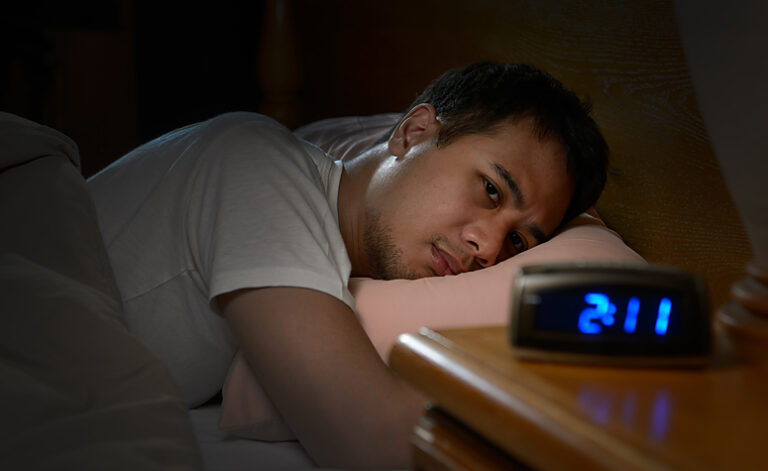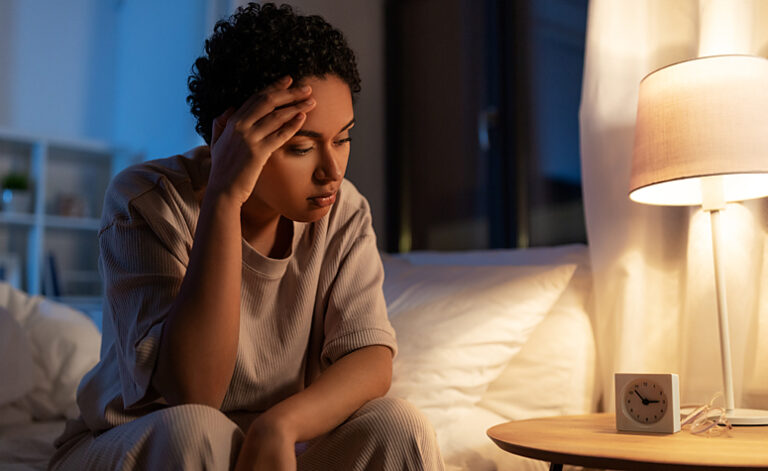Understanding and Treating Sleep Disorders
People with sleep disorders are frequently unable to achieve good quality sleep. If you have a sleep disorder, you will often experience difficulty falling or staying asleep and not feel refreshed and rested the following day.
A sleep disorder develops when your routine sleep pattern is disrupted to the extent that it adversely affects your overall physical and mental health. A lack of quality sleep can lead to fluctuations in your hormone levels, mood, and weight. People struggling with sleep disorders are prevalent. Approximately 6% of adults, or over 3.5 million people in the UK, report feeling sleepy during the day.
It is normal to experience occasional restless sleep due to the daily stress of modern life, for example worrying about a meeting or an important exam the following day. However, regularly struggling to fall asleep at night and waking up feeling excessively tired is a more serious issue.
Attempting to function effectively at school or work when you have very little energy can become progressively frustrating and debilitating. It can affect your ability to concentrate while doing everyday tasks, which can lead to accidents, deteriorating performance in school or at work, and even strained relationships.

A sleep disorder such as insomnia can hinder your ability to fall asleep at night, even when you feel exhausted. Over time, diminishing energy levels and a decreased ability to handle stress only increase the likelihood of a poor night’s sleep, making it challenging to break the cycle of an unhealthy sleep routine. Even if you’ve been having problems trying to sleep well for so long that it has become part of your daily routine, it’s not too late to change your lifestyle.
Our trained specialists can help you enhance your quality of life and regain the ability to rest, allowing you to function well during the day. They will work with you by observing symptoms and sleep patterns as well as discussing possible underlying causes that prevent you from getting a restful sleep.
Examples of common sleep disorders include:
Insomnia
Insomnia is a sleep disorder characterised by an inability to fall asleep promptly and being able to sleep long enough once you finally drift off. It is the most commonly complained sleep problem, with a higher rate of reported cases in women. About one in three women struggle with insomnia at some point in their lives, perhaps because women are more likely to seek help with sleep issues compared to men.
Insomnia appears to become more common with advancing age, although it can also affect children and adolescents. It is often associated with mood disorders such as anxiety and depression and other health conditions like stress, jet lag, high caffeine intake, and certain medications as a possible side effect.
Sleep apnoea
Sleep apnoea is a serious disorder characterised by pauses or repeated temporary cessations in breathing during sleep, each lasting for a few seconds. This sleep interference can result in exhaustion and irritability the following day. If left untreated, sleep apnoea can be life-threatening. Our apnea treatment involves focusing on possible associated mental health problems an individual may have, which might co-exist with sleep apnoea.
Narcolepsy
Narcolepsy is characterised by uncontrollable daytime sleepiness leading to involuntary and unpredictable episodes of sleep at work, while driving, or even in the middle of a conversation. This condition is due to a malfunction in the part of your brain responsible for regulating sleeping and waking, which typically responds to triggers such as brightness to establish more socially appropriate sleeping and waking cycles.
Restless leg syndrome (RLS)
Restless leg syndrome (RLS) is characterised by an urge to move your legs and sometimes arms during the night, often due to a general feeling of discomfort, including tingling or aching sensations while lying down. Reducing associated symptoms of RLS involves learning techniques for managing stress levels and improving the amount of quality sleep you get.

Signs and Symptoms of a Sleep Disorder
Although sleep is a subjective phenomenon, with every individual requiring varied amounts of sleep every night to function effectively, research indicates that those who get less than 3.5 hours of sleep regularly are likely to suffer from the harmful effects of sleep deprivation. Comprehensive therapy and treatment can help improve the problem of severe lack of sleep.
Other signs that you may be suffering from a sleep disorder include the following:
- Difficulty falling and staying asleep – a common symptom of insomnia,
which could be the result of excessive worry or an anxiety disorder,
depression, physical pain or simply an irregular sleep habit - Being awake most of the night, despite wanting and trying to sleep
- Waking up early in the morning and not being able to get back to sleep
- Interrupted sleep which may be caused by an uncomfortable bed,
nightmares or sleep apnea - Waking up tired and not refreshed
- Struggling to complete daily tasks due to lack of energy
- Reduced productivity and performance at work
- Poor concentration
- Indecisiveness
- Daytime drowsiness
- Irritability and agitation
If you experience some or all of the symptoms mentioned above, it may mean that you have a sleep disorder. If you are diagnosed with a sleep disorder, there is also a possibility that a co-existing health condition, such as anxiety or depression, may be also an additional contributing factor to your symptoms.
We have a specialist team of highly trained therapists who can help you modify your sleep-related behaviours and teach you techniques to reduce the daily anxiety and stress levels. This will help you increase the amount of sleep you get and improve the quality of your sleep and life.

You’ll never change your life until you
change something you do daily …
Causes of a Sleep Disorder
Many factors influence sleep, including environmental influences and your overall mental and physical health. Below are other factors that may increase your likelihood of developing a sleep disorder.
- Existing mental health problems (e.g. depression, stress, bipolar disorder, post-traumatic stress disorder (PTSD), anxiety)
- Certain physical health conditions (e.g. respiratory conditions, chronic pain, arthritis)
- Certain medications (e.g. steroid medication, medication for epilepsy and blood pressure, certain antidepressants)
- Poor sleeping environment
- Inconsistent sleep routine
- Napping during the day
- Shift work
- Smoking cigarettes, especially in the evening
- Consuming alcohol before going to bed
- Drinking too much caffeine, especially in the evening
- Recreational drug use
Other possible factors which may contribute to developing a sleep disorder include:
Genetics
Sleep disorders such as narcolepsy are caused by a malfunction in the part of the brain that controls sleep and wakefulness. Studies suggest that these disorders may potentially be due to an inherited problem from birth. techniques for managing stress levels and improving the amount of quality sleep you get.
Working unsociable hours
Your biological clock makes you feel sleepy during the dark hours of the day. However, if you have a job that requires you to work during the evening, you cannot fall asleep during those hours. This situation can lead to a sleep disorder because you are most active during the period of the day when the body naturally wants to “wind down”.
Medications
Certain types of drugs, such as some antidepressants or blood pressure medication, have side effects that can lead to sleep problems. If you are currently taking any of these medications, it is important to keep in mind that individuals may react to such drugs differently. Furthermore, it takes time for these drugs to settle in your system and the side effects to wear off.
If you are taking certain types of drugs, such as some antidepressants or blood pressure medication, the timing of administration, as well as the side effects of these drugs, can create problems with sleep. Keep in mind that everyone reacts to such medications differently, and it takes time for these drugs to settle in your system enough for any unwanted side effects to wear off.
Ageing
Approximately half of adults over the age of 65 are believed to exhibit symptoms of a sleep disorder. This may be due to the brain adjusting to old age or the increased likelihood of experiencing more health problems, aches, and pains at this stage of life, leading to a decline in sleep quality compared to their younger years.

Treatment for Sleep Disorders
If you suspect that you or someone you know may be struggling with a sleep disorder, it is essential to understand that you are not alone, and the most critical first step is to seek professional help. We have many expert consultant psychiatrists who specialise in sleep and sleep disorders.
Our team of medical experts understands that every individual experiences insomnia and sleep disorders differently. Therefore, we are dedicated to developing customised programmes to address your specific issues using methods that can produce the best outcomes for you.
The initial step in your recovery will be receiving a comprehensive assessment, which will help your assigned specialist determine whether your sleep problems are affected or caused by any other co-existing condition that may require treatment. Your specialist will then be able to direct your treatment based on your needs.
In the next step, our highly qualified specialists will teach you straightforward behavioural and lifestyle modifications you can make to enhance your ability to achieve regular, good quality sleep. The modifications may include rigorous sleep hygiene measures and regular relaxation exercises. These steps are essential in maintaining good sleep management because individuals need to actively do their part in therapy and treatment to sustain their progress.
Our experts also utilise cognitive behavioural therapy (CBT) as a way of dealing with the symptoms associated with sleep disorders and any underlying problems. CBT is extensively used in sleep disorder therapy and works by first tackling misconceptions, attitudes, and unhelpful behaviours that may be contributing to your sleep disorder, then guiding you towards having a healthier perspective on various situations. CBT has been proven to be a highly effective approach in helping people achieve a consistent sleep pattern and boost their health and wellbeing.
Four ways you can improve sleep disorder symptoms
If you are struggling with a sleep disorder, it is crucial to seek professional help and therapeutic guidance to help manage your stress levels. It is likewise important to undergo a treatment programme that addresses mental health conditions such as anxiety or depression, which may be contributing to your difficulties with sleep.
Nevertheless, maintaining a healthy daytime and bedtime routine ensures that you avoid developing a sleep disorder and are able to have a happy and healthy life for as long as possible.
Below are four lifestyle changes you can make to help improve your quality of sleep and overall wellbeing:

- Regular sleep hours
Regular sleep hours – making sure you keep regular bedtime and waking hours is one of the best ways to improve symptoms of a sleeping disorder. Consistently staying up late or waking up at different times every day can make it harder to program your body to fall and stay asleep long enough, thus preventing you from waking up energised and refreshed the next day.
- Create a relaxing sleeping environment
Make your bedroom or wherever you sleep conducive to quality sleep by making it as comfortable as possible. Sleeping with your pets can be disruptive if they move around as you sleep. Adjust the temperature, light, and noise to levels that will allow you to rest without any distractions. It is likewise important to avoid using your phone or watching TV before bedtime as these activities stimulate the brain, making it much harder to fall asleep.
- Exercise regularly
Although exercise may not directly influence your ability to fall or stay asleep, engaging in regular activities such as biking, swimming, or walking can effectively reduce stress and release endorphins, the “happy” chemicals in the brain. Endorphins has muscle relaxing properties that alleviate tension and worry, which may keep you from getting enough rest. However, it’s advisable to avoid exercising close to bedtime as you might become too energised and have trouble falling asleep
- Be creative
Expressing your innermost thoughts through writing, drawing, or playing an instrument can help reduce stress related to work, school, or personal problems that may cause sleep problems. Overthinking at night can make it harder for you to fall asleep, and you can prevent this from happening by writing down your worries and planning for the following day.
FREE Sleep Disorder Assessment
If your or a loved one are struggling with a Sleep Disorder, we understand the challenges you’re facing and we’re here to offer compassionate help.
Our highly trained advisers are available to speak to you right away, simply call 0808 252 3379 today.
We can discuss your concerns in complete confidence, explore the options for treatment, and help you to understand what will work best for you.
We’ll also help you to book your free Sleep Disorder assessment there and then, with appointments usually available within only a few days.
We understand that taking the first step can be the most difficult, but we’re here to support – with no pressure or judgement.
Professional and compassionate help is just a phone call or click away.




